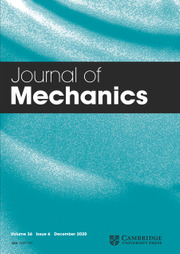No CrossRef data available.
Article contents
Analytical Study of Delamination in Multilayered Two-Dimensional Functionally Graded Non-Linear Elastic Beams
Published online by Cambridge University Press: 04 December 2017
Abstract
The present paper is focused on the delamination fracture in a multilayered two-dimensional functionally graded beam configuration which exhibits non-linear behavior of the material. The beam is loaded by two longitudinal forces applied at the beam free ends. The beam contains a delamination crack which is located symmetrically with respect to the beam mid-span. The delamination is studied analytically in terms of the strain energy release rate. The J-integral approach is applied for verification of the analysis of the strain energy release rate. The solution derived is valid for a beam made of an arbitrary number of layers. It is assumed that each layer has individual thickness and material properties. Also, the material is two-dimensional functionally graded in the cross-section of each layer. The solution obtained can be applied for a delamination crack located arbitrary along the height of the beam cross-section. It is shown that the solution is very convenient for investigating the influences of material gradients and crack location on the delamination fracture behavior. The results obtained can be used for optimization of multilayered two-dimensional functionally graded structural members and components with respect to their delamination fracture performance.
Information
- Type
- Research Article
- Information
- Copyright
- Copyright © The Society of Theoretical and Applied Mechanics 2018

